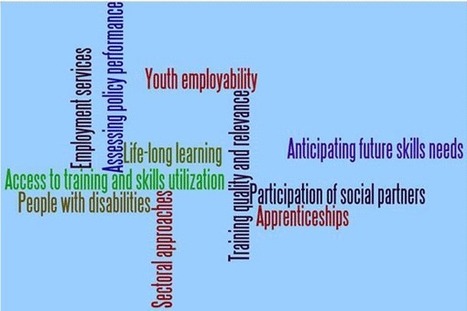 Your new post is loading...
 Your new post is loading...
Africa. The#FutureofWork in Africa : Harnessing the Potential of Digital Technologies for All The book focuses on the key themes of creating productive jobs and addressing the needs of those left behind. It highlights how global trends, especially the adoption of digital technologies, may change the nature of work in Sub-Saharan Africa by creating new opportunities and challenges. En français. Afrique. L’#avenirdutravail en Afrique : Exploiter le potentiel des technologies numériques pour un monde du travail plus inclusif Le document se penche sur deux questions fondamentales : comment créer des emplois productifs et comment subvenir aux besoins des laissés-pour-compte. Le rapport met en lumière comment l’adoption des technologies numériques, conjuguée à d’autres phénomènes mondiaux, transforme la nature du travail en Afrique subsaharienne et pose un défi en même temps qu’elle crée de nouvelles possibilités.
Many Sub-saharan African countries are facing huge challenges in creating relevant education and employment opportunities for their young and fast growing population. Demand for jobs outpace growth in job opportunities. While many of the jobs available are in technical and fields, Technical and Vocational Education and Training (TVET) is generally not leveraged effectively for a range of reasons - including lack of legislative and political support from the state, outdated curricula, insufficient public-private partnerships and undesirable perception of TVET among the public. However, even in the face of these challenges, there are a number of successful initiatives operating in TVET.
Recommendations to improve the state of TVET in this part of the world could be to recognize and support formal as well as informal TVET paths in order to improve its image. Also, the private sector could play a huge role by becoming more engaged in TVET through offering more internships, apprenticeships etc.
Last but not least, it seems important to cultivate an entrepreneurial mindset in the African youth, to move from job search to job creation.
This report provides an overview on the state of TVET in West Africa (focusing on Senegal, Nigeria, Ghana and Ivory Coast) and highlights examples of successful models and good practices from the ground.
Even before COVID-19 left as many as 1.5 billion students out of school in early 2020, there was a global consensus that education systems in too many countries were not delivering the quality education needed to ensure that all have the skills necessary to thrive. It is the poorest children across the globe who carry the heaviest burden, with pre-pandemic analysis estimating that 90 percent of children in low-income countries, 50 percent of children in middle-income countries, and 30 percent of children in high-income countries fail to master the basic secondary-level skills needed to thrive in work and life.
Reducing the number of vocational qualifications available is a current or recent priority area of many VET systems internationally, but what is the best way to achieve this and is there anything that needs to be considered? Focusing on cases studies on New Zealand, England, Finland and the Netherlands, this research summary explores approaches taken to rationalise VET qualifications, such as occupational clustering, and how they might be applied in the Australian context.
Amongst the body of national reports and policy statements classified as landmark documents on vocational education and training (VET) in Australia, research is the focus of only five. Given the documents cover a period from 1954 to 2010, clearly VET research has struggled to gain and retain a place on the VET agenda. The value of these five documents, however, should not be discounted for they raised the profile of research and consistently highlighted the challenges research has faced. Nor should the wisdom they contain be ignored as the relevance of their findings remain true for VET now and the future.
This short description contributes to better understanding of vocational education and training (VET) in Germany by providing insight into its main features and highlighting system developments and current challenges.
The Future of Work in Africa focuses on the key themes of creating productive jobs and addressing the needs of those left behind. It highlights how global trends, especially the adoption of digital technologies, may change the nature of work in Sub-Saharan Africa by creating new opportunities and challenges. It argues that, contrary to global fears of worker displacement by new technologies, African countries can develop an inclusive future of work, with opportunities for lower-skilled workers. Harnessing these opportunities is, however, contingent on implementing policies and making productive investments in four main areas. These are enabling inclusive digital technologies; building human capital for a young, rapidly growing, and largely low-skilled labor force; increasing the productivity of informal workers and enterprises; and extending social protection coverage to mitigate the risks associated with disruptions to labor markets. This companion report to the World Bank’s World Development Report 2019 concludes with important policy questions that should guide future research, whose findings could lead to more inclusive growth for African nations.
This joint ILO-UNESCO report provides a global, high-level overview of how digitalization is affecting TVET and skills systems. It draws on consultations with key stakeholders in a set of countries and international organizations to provide insights into the nature and scope of digitalisation and how it is likely to affect the management, delivery, assessment and certification of technical and vocational education and training. The study draws on developments in Brazil, Ghana, India, Kenya, Malaysia, Malta, Mauritius, New Zealand, Slovenia, Turkey and the United States.
The report captures the immediate effects of the pandemic on the lives of young people (aged 18–29) with regards to employment, education, mental well-being, rights and social activism. Over 12,000 responses were received from young people in 112 countries.
his white paper aims to build on the roundtable, summarizing what we know from past and current research, identifying knowledge gaps, and putting forward a set of potential research questions informed by the roundtable discussions that can help define future research opportunities and inform future directions for OPRE’s and other federal agencies’ research and evaluation portfolios and for the broader field of researchers and practitioners
Around the world, young people face considerable challenges. Even before the disruption of the Covid-19 crisis, policymakers were seeking to respond to rapid technological advances, climate change and – in some countries – an ageing population and workforce. While children and young people worldwide generally have high aspirations and ambitions for their futures, evidence shows that they often face problematic and protracted transitions into work. In this context, new pathways from school to employment are needed. In this paper, we review extensive evidence to provide guidance on how children and young people can be best prepared to succeed in their school-to-work transitions, both now and in the future.
This new report makes seven recommendations for creating a more coherent and responsive skills system to support small and medium enterprises (SMEs) and lifelong learning in England.
|
Canada’s small and medium-sized enterprises (SMEs) account for more than 90% of private-sector jobs in Canada. To be competitive in today’s market, they need the right people with the right skills, yet they are disproportionately threatened by labour shortages and skills gaps - a situation made worse by COVID-19. Unlike large corporations, SMEs possess limited resources, making it exponentially more challenging to support these human resources needs. There is a dire need for innovative research & solutions.
It estimates the magnitude of the low-skilled adult population according to a broader conceptualisation which goes beyond educational attainment levels, and considers digital skills, literacy and numeracy, as well as skill loss and skill obsolescence. The study also identifies different subgroups of adults most at risk of being low-skilled, by skill dimension. Better understanding the magnitude of the low-skilled adult population and recognising different and specific target groups within the heterogeneous group of adults with potential for upskilling and reskilling, is crucial to better design and implementation of effective upskilling pathways for those most in need.
The State of Women’s Entrepreneurship in Canada 2020, the first annual report from the Women Entrepreneurship Knowledge Hub (WEKH), synthesizes government, academic, and expert research to highlight some of the structural barriers facing diverse women entrepreneurs in Canada. The research shows clearly that COVID-19 has amplified structural barriers, has affected women entrepreneurs more than men and has affected Indigenous, racialized and other diverse entrepreneurs most of all.
Recent advances in artificial intelligence and machine-learning technologies have fuelled fears of potential job losses among some workers. While the net impact of new technology on total jobs can be negative, positive or neutral, some workers may be more affected than others depending on how easily robots and algorithms can replace them, or how easily their skills complement
The transportation industry currently ranks below most other federally regulated employers when it comes to workforce diversity. Women account for 48.2% of Canada’s workforce, but only 3.5% of the nation’s truck drivers. Additionally, only 3.4%
of drivers are under 30 compared to 12.7% across the Canadian economy. New Canadians represent 27% of truck drivers in Canada. Truck drivers are also trending older. 32% of truck drivers are over 55 years or age, but only 21% of the entire workforce is that age. There are opportunities to reach out to these under-utilized sources of talent.
This paper provides a broad, thematic overview of the Australian VET workforce from the Tregillis report in 1969 to the present. It draws on the landmark documents and refers also to others3 that, while not classified as landmark, have nevertheless helped to provide further perspectives on the VET workforce in the years since then. Following a summary of the key focus and significance of each of the four landmark reports, the paper analyses some potential reasons for the relative dearth of information about the VET workforce, and then concentrates on three main questions that arise from these reasons: what is known about the VET workforce, what capabilities does it require to carry out its roles effectively, and how can it be most appropriately prepared and developed?
This report summarises the key insights and lessons from the review of skills governance in Slovakia. Using input from a wide stakeholder consultation and an online opinion survey among employers and VET providers, it analyses current challenges and bottlenecks, with a view to uncovering the root causes of key skills governance issues. Thoughts on possible progress and examples from other countries aim to inspire policy-makers in shaping ideas for further work.
Sub-Saharan Africa has the youngest population of any region of the world, and that growing working-age population represents a major opportunity to reduce poverty and increase shared prosperity. But the region’s workforce is the least skilled in the world, constraining economic prospects. Despite economic growth, declining poverty, and investments in skills-building, too many students in too many countries in Sub-Saharan Africa are not acquiring the foundational skills they need to thrive and prosper in an increasingly competitive global economy. This report examines the balancing act that individuals and countries face in making productive investments in both a wide range of skills – cognitive, socio-emotional, and technical – and a wide range of groups – young children through working adults – so that Sub-Saharan Africa will thrive.
This report details the findings of research into national training funds linked to employer levies in eight countries of the Southern African Development Community (SADC): Botswana, Malawi, Mauritius, Namibia, South Africa, United Republic of Tanzania, Zambia and Zimbabwe.
The report includes an international literature review of levy systems globally to inform the country research which involved secondary data analysis, an online survey, and in-depth interviews with key stakeholders in the eight countries involved. The research drew on the views of representatives from government, the organizations managing the training funds, workers’ organizations and employers’ organizations. The report makes high level recommendations on levy based training funds in general as well as for the eight national training funds reviewed which are documented through country briefs in Part B of this report.
The economic crisis caused by COVID-19 has shone a spotlight on the need to reform Canada’s income-support framework. Combine this with the looming risks of automation and age-related labour shortages, and we have a strong case for creating a modern framework that promotes work and minimizes earning losses for dislocated workers. As we rebuild our economy following the crisis, Canadian policy-makers will need to grapple with this complex and critical task.
Categorizing workers with generational labels like “baby boomer” or “millennial” to define their needs and behaviors is not supported by research, and cannot adequately inform workforce management decisions,. Instead of relying on generational stereotypes, employers and managers should focus on individuals’ work needs. The report, Are Generational Categories Meaningful Distinctions for Workforce Management?, says that varied values and behaviors among workers are more likely to reflect differences in their ages, career stages, job experiences, and general changes in society and work conditions, rather than their generations.
This report looks at how the pandemic is impacting the apprenticeship sector, in particular those from disadvantaged backgrounds.
Our companion report, Degree Apprenticeships: Levelling Up?, explores whether degree apprenticeships are delivering for social mobility, highlighting that many employers are using the degree apprenticeship scheme to fund senior-level programmes, instead of helping young people access the workplace.
|



 Your new post is loading...
Your new post is loading...






















